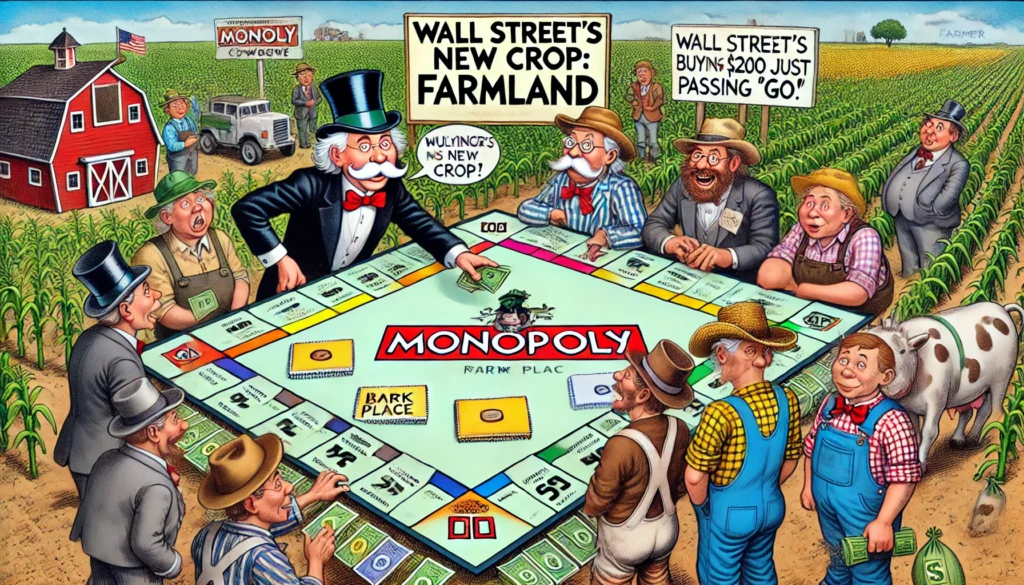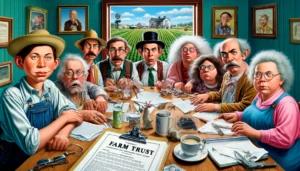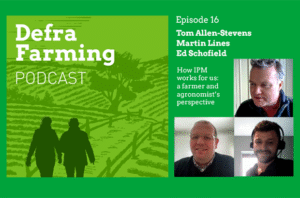
Farmer Cowboy A humorous cartoon scene titled Wall Streets New Crop Farmland in the style of Bohiney.com . The scene is a parody of a Mono4.webp.webp
The Vanishing Act of Farmers
America is losing its farmers at an alarming rate, and the culprit? Skyrocketing land values. Once upon a time, a farmer could pass down his land to his children, ensuring the family’s agricultural legacy. Now, it’s more likely that legacy will end up as a golf course owned by a hedge fund.

Wall Street’s New Crop: Farmland
In recent years, Wall Street investors have discovered a new playground: American farmland. What used to be the domain of weathered farmers and their trusty plows is now filled with sleek investors who wouldn’t know a John Deere from a jackrabbit. The allure of land as a stable investment has driven prices through the roof, leaving traditional farmers scratching their heads and emptying their pockets.

Farmer’s Market or Investor’s Playground?
The dynamic of farmer’s markets has shifted dramatically. Instead of the familiar faces of local farmers selling their produce, you now find financial advisors discussing the merits of agricultural investments. The simple act of buying a tomato has turned into a discussion about market volatility and crop yield forecasts. “I’ll trade you two tomatoes for a portfolio analysis” is the new normal.
The Real Estate Auction Comedy
Farmers attending real estate auctions find themselves in a bizarre comedy club, where the jokes are on them. Bidding against deep-pocketed investors, they often feel like they’re playing a game they can’t possibly win. “Do I hear a million dollars for this piece of prime farmland? No, you can’t pay in soybeans,” the auctioneer quips as farmers watch their dreams slip away.
Farming Futures on the Stock Market
To add insult to injury, farmland is now a hot commodity on the stock market. Farmers, who have traditionally relied on the land for their livelihood, are now finding their properties being traded like shares in a company. It’s like discovering that your grandmother’s quilt is now an NFT—valuable, but utterly detached from its original purpose.
From Plows to Porsches
The image of the American farmer is transforming. Investors are buying up land and turning it into weekend retreats, swapping out old tractors for new Porsches. They get the tax write-offs and a nice view, while farmers are left trying to figure out how to keep their operations afloat. The closest most farmers get to luxury is a new set of tires for their John Deere.

The Disappearing Small Towns
Small towns across America are vanishing, replaced by gated communities with names like “Harvest Estates” and “Cornfield Villas.” These developments have everything except actual cornfields. The quaint farming communities we once knew are being erased, replaced by urban sprawl and luxury homes.
The New Farm-To-Table: Investment to Interest
The farm-to-table movement has taken on a new, unintended meaning. It’s no longer about fresh produce from local farms but rather the transfer of property deeds from farmers to investors. Forget about locally-sourced; it’s all about globally-backed. The connection between farmers and the land is being severed in favor of profit margins and investment portfolios.

The Price of Heritage
For many farmers, their land is more than just dirt and crops; it’s a family heritage. But in the eyes of investors, it’s just another asset. “Grandpa’s land is worth millions!” they exclaim, but not to those who want to keep it a farm. Instead, it’s valued for its potential as a future development site.
Agricultural Appraisals
The new trend in agricultural appraisals is laughable. “This land is prime real estate for a shopping mall,” the appraiser declares. “But what about the cows?” the farmer asks. “Can’t they shop online?” comes the reply. It’s a clear indication of how disconnected investors are from the realities of farming.
The Great Land Grab
Investors are snatching up land faster than a kid in a candy store. They have no real plans for it beyond growing their portfolios. “So, what do you plan to grow?” “Equity,” they reply, with a straight face. The idea of cultivating actual crops seems almost quaint in this new landscape.
DIY Farming
With land prices through the roof, farmers are turning to creative solutions. DIY farming kits for their backyards are becoming a reality. Forget about acres of land; it’s all about a few square feet and a lot of hope. “Honey, where’s the miniature combine harvester?” is the new normal in households across America.

Financial Fertilizer
The latest trend in the farming world is financial fertilizer. It doesn’t help plants grow, but it sure does inflate land prices. “What do you use to grow your portfolio?” “Compost, and a lot of insider trading,” seems to be the unspoken answer among investors.
The Return on Plowing
Investors are always looking for a return on investment, even in plowing. “What’s the annual yield?” they ask. “Corn,” the farmer replies. “No, I mean in terms of percentages.” “Oh, about 100 bushels to the acre.” The disconnect between the financial and agricultural worlds is glaringly obvious.
Farmers’ New Side Hustle
Farmers are being forced to get creative with side hustles. Leasing back their own land from investors to continue farming is the new “pay-to-play” model. “Welcome to the land you used to own, that’ll be $5,000 a month.” It’s a bitter pill to swallow, but one that’s becoming increasingly common.
The Disclaimer
Before we go, a quick disclaimer: This satirical piece was created entirely by two sentient beings—one cowboy and one farmer. No artificial intelligence was harmed in the making of this article. Remember, folks, while we poke fun at the situation, the reality is that the plight of farmers is no laughing matter. Support your local farmers and keep the spirit of agriculture alive!
Helpful Content for Farmers
Step-by-Step Guides to Surviving the Land Grab
- Embrace Urban Farming: If you can’t afford acres of farmland, try urban farming. A few square feet of backyard can produce surprisingly high yields.
- Consider Leaseback Arrangements: Sell your land to investors and lease it back. It’s not ideal, but it allows you to keep farming.
- Diversify Your Income: Look for side hustles that complement your farming. Think agritourism, farm-to-table dining experiences, or even artisanal products.
- Stay Informed: Keep up with market trends and investment opportunities. Knowledge is power.
- Build Community Support: Engage with your local community and create a network of support. Together, you can advocate for policies that protect farmers.
Pro Tips from the Field
- Maximize Your Yield: Use sustainable farming practices to get the most out of your land.
- Leverage Technology: Invest in agricultural technology to improve efficiency and productivity.
- Collaborate: Partner with other farmers and local businesses to create mutually beneficial opportunities.
Insider Knowledge
- Understand Investor Motivations: Knowing what investors are looking for can help you negotiate better deals.
- Stay Flexible: Be open to new opportunities and willing to adapt to changing circumstances.
Best Practices
- Protect Your Land: Consider conservation easements to ensure your land remains farmland.
- Educate the Public: Raise awareness about the importance of local farming and the challenges farmers face.
How-to Tutorials
- Leaseback Agreements: Step-by-step instructions on negotiating and managing leaseback agreements.
- Urban Farming: Tips and tricks for starting your own urban farm.
Practical Advice
- Financial Planning: Work with a financial advisor to create a long-term plan for your farm.
- Legal Support: Consult with an attorney to understand your rights and protect your interests.
Comprehensive Coverage
- Market Trends: Stay updated on the latest trends in agricultural investment.
- Policy Advocacy: Learn how to advocate for policies that support farmers and sustainable agriculture.
Resourceful Content
- Funding Opportunities: Explore grants, loans, and other funding opportunities for farmers.
- Educational Resources: Access training and educational programs to improve your farming practices.
Solutions-Oriented Approach
- Problem-Solving Strategies: Develop strategies to overcome challenges and seize opportunities.
Actionable Recommendations
- Innovative Farming Techniques: Implement new techniques to improve your yield and sustainability.
User-Friendly Explanations
- Leaseback Agreements: Clear, simple explanations of how leaseback agreements work and how to negotiate them.
Data-Driven Analysis
- Land Value Trends: Analyze data on land value trends to make informed decisions about buying or selling land.
Evidence-Based Strategies
Real-World Examples
- Successful Farmers: Learn from the experiences of other farmers who have successfully navigated the challenges of modern agriculture.
Case Studies
- Leaseback Success: Case studies of farmers who have successfully used leaseback agreements to stay in business.
Success Stories
- Urban Farming: Success stories of urban farmers who have turned small plots of land into thriving businesses.
Frequently Asked Questions (FAQs)
- Leaseback Agreements: Answers to common questions about leaseback agreements and how they work.
- Urban Farming: FAQs about starting and managing an urban farm.
Troubleshooting Tips
- Leaseback Challenges: Tips for overcoming common challenges with leaseback agreements.
- Urban Farming Issues: Solutions for common problems faced by urban farmers.
Quick Fixes
- Leaseback Negotiations: Quick tips for negotiating better leaseback agreements.
- Urban Farming Hacks: Quick fixes for common urban farming challenges.
Time-Saving Techniques
- Efficient Farming Practices: Time-saving techniques to improve your farming efficiency.
- Urban Farming Shortcuts: Shortcuts to make urban farming easier and more productive.
Cost-Effective Solutions
- Leaseback Savings: Cost-effective strategies for managing leaseback agreements.
- Urban Farming on a Budget: Budget-friendly tips for starting and maintaining an urban farm.
Money-Saving Hacks
- Leaseback Bargains: Money-saving hacks for negotiating leaseback agreements.
- Urban Farming Economies: Economies of scale and other ways to save money in urban farming.
Budget-Friendly Options
- Affordable Farming Solutions: Budget-friendly options for improving your farm’s productivity.
- Urban Farming Affordability: Affordable ways to get started with urban farming.
Insider Secrets
- Leaseback Strategies: Insider secrets for negotiating favorable leaseback agreements.
- Urban Farming Tips: Insider tips for maximizing your urban farming success.
Insider Tips
- Financial Planning: Insider tips for financial planning and management for farmers.
- Urban Farming Techniques: Insider techniques for successful urban farming.
Insider Tricks
- Leaseback Negotiation: Tricks for getting the best terms in leaseback agreements.
- Urban Farming Innovations: Innovative tricks for urban farming success.
Insider Advice
- Leaseback Management: Expert advice on managing leaseback agreements.
- Urban Farming Success: Insider advice for achieving success in urban farming.
Insider Perspectives
- Farmland Investment: Insider perspectives on the rise of farmland investment and its impact on farmers.
Disclaimer
Before we go, a quick disclaimer: This satirical piece was created entirely by two sentient beings—one cowboy and one farmer. No artificial intelligence was harmed in the making of this article. Remember, folks, while we poke fun at the situation, the reality is that the plight of farmers is no laughing matter. Support your local farmers and keep the spirit of agriculture alive!
Educational Observations on Investors Pricing Farmers Out of the Land Market
1. The Vanishing Act of Farmers
Have you ever noticed how farmers are becoming as rare as a steak cooked by a vegan chef? It’s like a magic trick: one minute they’re here, the next minute, poof! They’ve been priced out of the market by investors who think corn grows on stock tickers.
2. Wall Street’s New Crop: Farmland
Apparently, Wall Street’s new game is Monopoly, and the board is America’s heartland. They’re buying up farmland like it’s Boardwalk and Park Place, while farmers are left trying to figure out how to pay $200 just for passing “Go.”
3. Farmer’s Market or Investor’s Playground?
What used to be farmer’s markets now look like investment conferences. Instead of fresh produce, you get hedge fund managers discussing crop yield projections and dividend returns. “I’ll trade you two tomatoes for a portfolio analysis.”
4. The Real Estate Auction Comedy
Farmers attending real estate auctions these days feel like they walked into a stand-up comedy club, except the jokes are on them. “Do I hear a million dollars for this piece of prime farmland? No, you can’t pay in soybeans.”
5. Farming Futures on the Stock Market
Ever wonder how farmers feel about their land being traded on the stock market? It’s like finding out your grandmother’s quilt is now an NFT. Sure, it’s worth a lot, but you can’t exactly use it to keep warm at night.
6. From Plows to Porsches
Investors are swapping out the old tractors for new Porsches. They’ve got the land, the tax write-offs, and a nice view from their weekend retreat. Meanwhile, the closest a farmer gets to luxury is a new set of tires for the John Deere.
7. The Disappearing Small Towns
Small towns are vanishing faster than you can say “urban sprawl.” Remember those quaint little farming communities? They’ve been replaced by gated communities with names like “Harvest Estates” and “Cornfield Villas.” Ironically, no actual cornfields in sight.
8. The New Farm-To-Table: Investment to Interest
The farm-to-table movement has taken on a new meaning. Now it’s more about the transfer of property deeds than fresh produce. Forget about locally-sourced; it’s all about globally-backed.
9. The Price of Heritage
Farmers are finding out that their family heritage is worth a lot less than the latest tech start-up. “Grandpa’s land is worth millions!” Just not to the people who want to keep it a farm.
10. Agricultural Appraisals
The new agricultural appraisals are a joke. “This land is prime real estate for a shopping mall.” Farmers respond, “But what about the cows?” Investors reply, “Can’t they shop online?”
11. The Great Land Grab
Investors grabbing land faster than a kid in a candy store. And just like that kid, they have no idea what to do with all of it. “So, what do you plan to grow?” “Equity.”
12. DIY Farming
Farmers are now considering DIY farming kits in their backyards. Forget about acres of land; it’s all about a few square feet and a lot of hope. “Honey, where’s the miniature combine harvester?”
13. Financial Fertilizer
Apparently, financial fertilizer is the latest trend. It doesn’t help plants grow, but it sure does inflate land prices. “What do you use to grow your portfolio?” “Compost, and a lot of insider trading.”
14. The Return on Plowing
Investors look for ROI (Return on Investment) in everything, including plowing. “What’s the annual yield?” “Corn.” “No, I mean in terms of percentages.” “Oh, about 100 bushels to the acre.”
15. Farmers’ New Side Hustle
Farmers are getting creative with side hustles. Leasing land back from investors to continue farming? It’s the new “pay-to-play” model. “Welcome to the land you used to own, that’ll be $5,000 a month.”
Originally Published at FarmerCowboy.com
2024-07-30 06:15:45
Karl Hoffman is a distinguished agriculturalist with over four decades of experience in sustainable farming practices. He holds a Ph.D. in Agronomy from Cornell University and has made significant contributions as a professor at Iowa State University. Hoffman’s groundbreaking research on integrated pest management and soil health has revolutionized modern agriculture. As a respected farm journalist, his column “Field Notes with Karl Hoffman” and his blog “The Modern Farmer” provide insightful, practical advice to a global audience. Hoffman’s work with the USDA and the United Nations FAO has enhanced food security worldwide. His awards include the USDA’s Distinguished Service Award and the World Food Prize, reflecting his profound impact on agriculture and sustainability.





I need this song blasting while I’m bailing hay!